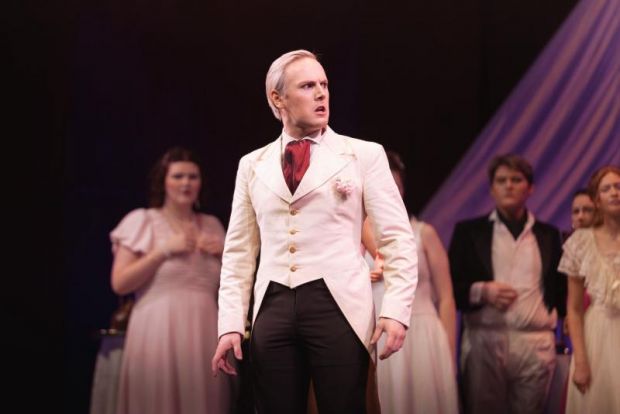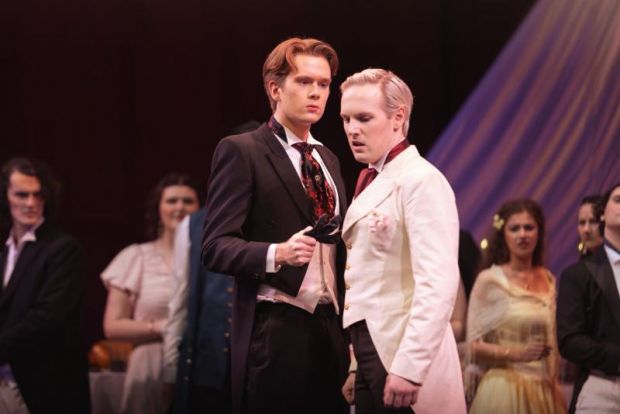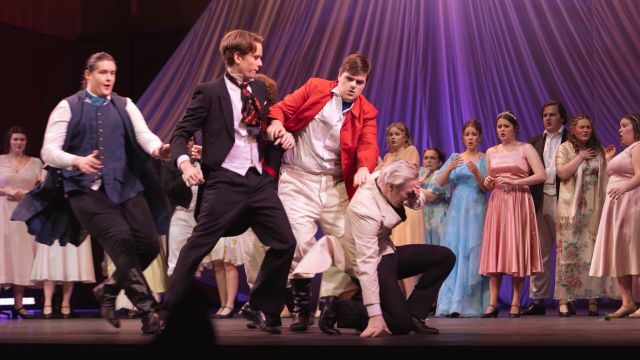The Val Machin Opera Scenes 2025
The Conservatorium’s popular opera showcase once again highlighted the skill and promise of its student performers, this time with an ambitious pairing: a theatrical re-imagining of Mendelssohn’s Elijah alongside the Act II, First Tableau from Tchaikovsky’s Eugene Onegin. Each work, drawn from very different traditions, offered students the chance to grapple with demanding music and complex staging, and the results were both successful and engaging.
Mendelssohn’s Elijah, originally conceived as an oratorio, has often tempted directors into the world of theatre because of its innate dramatic tension and operatic sweep. In this presentation, the action was set in a contemporary underworld, a stark backdrop that underscored the work’s intensity while allowing the chorus to emerge as the true protagonist. The score’s dynamic choral writing, especially in the final section, rang out with striking clarity and urgency. If the libretto at times felt dated, that limitation was soon eclipsed by the conviction and vocal strength of the cast. Jake Lyle, in the title role, commanded attention with a performance that balanced authority and vulnerability, while the ensemble’s unified sound demonstrated the high calibre of training and musicality at the Conservatorium. The production’s simple staging - uncluttered, atmospheric, and effective - kept the focus firmly on the music.

Tchaikovsky’s Eugene Onegin was written during a turbulent period in the composer’s life, and not without coincidences, and the excerpt performed here, the lively ballroom scene of Act II, showcased Tchaikovsky’s talent at weaving social dances into his operatic fabric. The central waltz, famously borrowed later for a ballet adaptation of the opera, was given stylish treatment: danced and sung with precision and an infectious sense of movement that drew the audience into the swirl of the party. Harrison Hammett as Onegin and Liam Jackson as Lenski brought charismatic presence to the stage, their contrasting temperaments and resonant voices giving a glimpse of the tragic drama to come. Elliot Beauchamp, who earlier contributed movingly as Obadiah in Elijah, offered a lilting and elegant rendering of Triquet’s aria - one of the evening’s vocal highlights.
Both works benefited from the assured direction of Lois Redman, whose sensitivity to movement and stagecraft ensured that even in staged excerpts, dramatic arcs felt complete. Particularly in Onegin, her handling of the waltz scene created a sense of fluidity and theatrical flair. At the podium, Associate Professor Peter Luff brought vigour and clarity to the performances, drawing disciplined, expressive playing from the student orchestra - the overture to Onegin, in particular, was most rousing - and allowing the singers the space to shine.

Beyond the individual achievements, these showcases serve as a vital training ground for emerging artists and a celebration for staff, families, and supporters. They offer audiences the chance to witness the shaping of Australia’s next generation of operatic talent, and the standard on display suggests a bright future for these students. To see and hear such artistry, energy, and promise in a university setting is both a privilege and a pleasure.
Brian Adamson
Subscribe to our E-Newsletter, buy our latest print edition or find a Performing Arts book at Book Nook.

